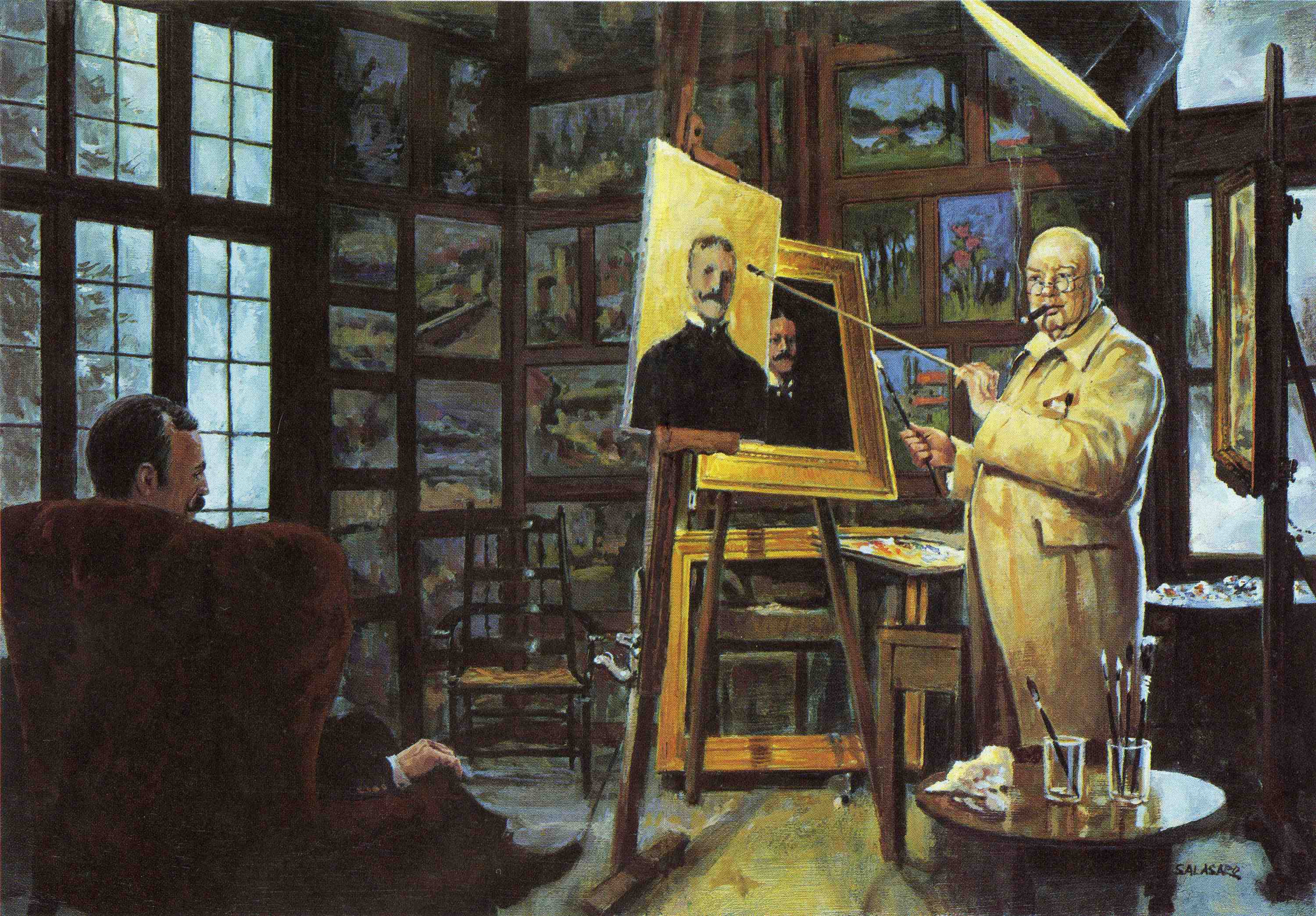
Question for Readers: What did Churchill Mean by “Man is Spirit”?
“Man is spirit”
Winston Churchill retired as Prime Minister on 5 April 1955. On April 3rd, he met with his non-Cabinet ministers. His last words were reported by William Sidney, Viscount De L’Isle and Dudley, his neighbor in Westerham, to Martin Gilbert. “Man is spirit,” he told them. Then he added: “Never be separated from the Americans.”
The latter is well understood. In 1956, when he wasn’t around, there was quite a serious separation, over Suez. “Man is spirit” is harder to understand. What did Churchill mean?
A professor teaching Churchill’s statesmanship says his class is going back and forth on that. It’s a good question.
The professor asked my friend Andrew Roberts, who offered a thoughtful explanation. “Churchill meant that given spirit—by which Victorians like him meant courage, drive, gumption and spunk—people can achieve anything regardless of all other limitations. Despite appearances, we are not bound by the physical but are part of the metaphysical.” Andrew then handed off to me, as if I knew a lot more! He did send me trawling through the sources.
Something metaphysical?
Few historians have tackled the question of what “Man is spirt” meant. One was Jon Meacham, who wrote in Franklin and Winston:
“I believe that man is an immortal spirit,”: [Churchill] often said, leading Anthony Montague Browne, his last private secretary, to call him “an optimistic agnostic.” Churchill’s essential view: “Whether you believe or disbelieve, it is a wicked thing to take away Man’s hope.”
It seems possible that “Man is spirit” meant something metaphysical, as Andrew suggests, beyond the Victorian virtues.
Spirit as self-belief?
In 2006 the late John Ramsden published “Churchill: A Man who Believed,” in the Catholic magazine The Tablet. Ramsden fleshed out Montague Browne’s “optimistic agnostic”:
Churchill once said that he was not a pillar of the Church but more like a buttress—he supported it from the outside. He had been brought up in the 1880s firmly within the Anglican tradition that had then barely changed for two centuries. [In The Dream, he tells the ghost of his father he is “Episcopalian.”]
His direct involvement with the Church was though at best semi-detached…. Churchill was not a Christian believer in any conventional sense. Archbishop Fisher of Canterbury thought that WSC “had a very real religion, but it was a religion of the Englishman. He had a real belief in Providence, but it was God as the God with a special care for the values of the British people…..
What Churchill seems never to have had was a belief in a personal God. He joked as he aged that he was ready to meet his Maker, and speculated as to whether the Almighty was looking forward to their interview with equal pleasure; but he did not in fact believe in an after-life, except perhaps as some perpetual sleep in surroundings of peaceful, black velvet….
What Churchill did believe in was himself, fate, and his personal vocation to leadership…. Believing in himself as he did, he found within the capacity to make the British people believe in themselves too, a crucial historical act that even today can be cited to the cynics as proof that individuals can and do make a difference
A question for readers
Perhaps that has something to do with what Churchill was trying to express by saying “Man is Spirit.” Certainly his spirit abides, and still guides us today.
But my knowledge of Churchill and the metaphysical is thin. If any reader would like to take a stab at Churchill’s meaning, do send me your thoughts. (Scroll down to “Leave a Reply,” below.)
Further reading
Reader Richard Cohen suggests that the answers may lie a letter Churchill left for wife. It was just before departing for Flanders in the First World War. See: “To be opened in the event of my death.”







4 thoughts on “Question for Readers: What did Churchill Mean by “Man is Spirit”?”
We must be mindful of the context to understand the meaning. Here Sir Winston Churchill was giving pearls of very practical and applicable wisdom, not just theory or beliefs. To deal with men you must understand you’re dealing with the human spirit. As Napoleon wrote, “A man does not have himself killed for a few halfpence a day or for a petty distinction. You must speak to the soul [the spirit in man] in order to electrify the man.”
As I read your query this morning I am in the midst of reading Professor Paul A. Cantor’s Shakespeare’s Rome: Republic and Empire. In his introduction and first chapter he clearly describes the difference between men who are moved by spiritedness (in Greek, thumos) and men who are moved by their appetites (in Greek, eros). Shakespeare seems to have known of the discussion of the importance of thumos in the soul in Plato’s Republic. This would be a good place to begin in considering what Churchill meant by saying “man is spirit.”
Charles, that’s very thoughtful, and much appreciated. Of course as Andrew Roberts remarked, God in WSC’s belief system had a very special responsibility, which was looking out for Winston Churchill. Given WSC’s many narrow escapes from Cubans, Pathans, Dervishes, Boers, Germans, Fenians, New York motorists, and assorted nationalists who took a decidedly dim view of his public work, he might have been right.
Richard,
Given WSC’s strong belief in “Destiny”, both his own and that of the English-speaking people’s, I have concluded that his frequent use of the term signified a belief in a power (even) greater than himself, which to humankind of any/all religions signifies a belief in God. Whether or not the Christian God is idle speculation and not truly important. Churchill had and felt a connection with the best of the human “spirit” which I have concluded was his God. As he got older he became more aware of that “Spirit”, as we all do.
Comments are closed.